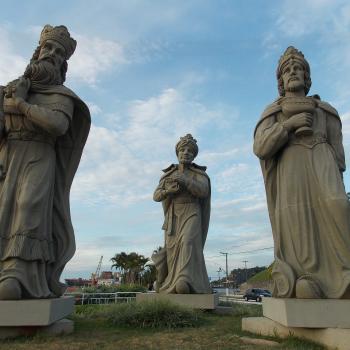As we pick up our conversation about Gregory of Nyssa, I want to recall what Anatolios calls the “limitless horizon” of faith—that our understanding and trust can never seize the fullness of God, they can only move in the direction of that truth. The horizon of God always extends itself infinitely before us. “The inexhaustible plenitude of God”—the never-ending, infinite depth and breadth of the reality of God’s being—is the invitation to an “endless journey” of relationship. All our doctrines, true as they may be, are not sufficient statements; they are “stepping stones” of discovery.
Gregory builds on this concept by exploring the multiple names of God given to us in scripture: Creator, Father, Wisdom, Righteousness, Sanctifier, Lord, Healer, Alpha, Omega, Master, Helper, Husband, Rock, Shepherd, Holy One, King, and many more. All these names, according to Gregory, reflect vivid facets of the Divine Being; they draw us in, lure us into the richness of God’s essence, envelop us in God’s wonder and greatness so that, as Gregory writes, “we might be led by the hand by providential words and lay hold of the divine nature.”
Such a gentle, wooing perspective—we are “led by the hand.” God draws us to himself. And note that these “providential words” that lead us to God are multiple, not binary. What I mean by that is that when we attribute one primary, overriding characteristic to God, we can easily get stuck in a categorical mindset (static, like a box) rather than a relational one (dynamic, like light). Eunomius argued that God’s #1 name was ‘Unbegotten’ and that everything else was secondary to this overriding characteristic. Gregory felt this limited God, made God more a fill-in-the-blank kind of deity rather than the incomprehensible God that he is.
(Eunomius’ singular preference was ‘Unbegotten,’ but yours might be something more like Sovereign One, or Judge; or, if you’re a “progressive Christian,” Justice or Compassionate One. These are all authentic names for God, but Gregory would remind us that no single name suffices for the fullness of who God is. We get in trouble when we try to bracket any of the names that God has revealed to us, as though they are subsidiary, footnotes to the bigger picture… which we always know for sure, right?)
Then we get to Jesus Christ—the Name above all names—and here Gregory enters into the Trinitarian debate in full. For Jesus is the nexus, the bridge, the gate, the meeting place, the Image.
Eunomius knew this scriptural argument quite well. (Remember, all of our church fathers were not only biblically literate, but deeply steeped in the words of scripture.) The sticking point between them is not scripture. So what is it? It’s actually so 21st-century. So let’s imagine a little dialogue between Gregory and Eunomius about this very issue:
Gregory: Many of the titles given to God are also attributed to Jesus. Doesn’t that tell you something about who Jesus is?
Eunomius: Yes, but those titles are only partially true when it comes to Jesus. The fact that he’s begotten shows that his nature cannot bear the full reality of these titles.
Gregory: But if Jesus is “the power of God and the wisdom of God” (as Paul tells us), then are you saying he’s only partial Wisdom? If Wisdom is one of God’s names, and God is fullness and perfection in all that He is, then you can’t have a fraction of Wisdom… mixed with non-Wisdom? Nonsense. Your understanding of ‘begotten’ needs to change.
Eunomius: But in scripture you also find some of those exalted names attributed to other human beings or even other creatures.
Gregory: Yes, but when you look at scripture as a whole, there is clearly a difference between what it’s saying about Jesus and what it’s saying about anyone or anything else.
Eunomius: That’s a big leap, though, from ‘different’ to ‘divine.’
Gregory: Then what do you do with a passage like John 5:23—“that all may honor the Son just as they honor the Father”—or John 16:15—“all that the Father has is mine”?
Eunomius: I have to interpret those passages in light of the way I understand ‘begotten.’
Gregory: Ah, this is your problem. You should be interpreting ‘begotten’ in light of the way you understand those passages.
I invent this short exchange to point out the critical difference between Eunomius (and all the Arian-affiliates) and Gregory (and all the Nicene-affiliates): hermeneutics, or the art of interpretation. It all depends on where you start. We all start with the same texts, and we bring our interpretive lens to our reading, and we come to different conclusions.
For Gregory, the clear key to interpreting these scriptures about Jesus was the Church’s practice of worship. Anatolios writes thus: “That Christian faith consists in the maximal and strict interpretation of these titles can finally be settled by recourse to the fact that Christians worship Christ.” And he cites Gregory:
This then is the chief point of Christian piety: to believe that the only-begotten of God, who is Truth, and true Light and Power of God and Life, truly is what he is said to be, above all especially in that he is God and Truth, which is to say, God in truth, always being what he is conceived to be and what he is called. . . . Such is the understanding that prevails among all Christians, . . . those who have been taught by the Law to worship nothing that is not truly God and by that worship to confess that the only Begotten is God in truth and not a God falsely so called.
So this might be Gregory’s last word:
Gregory: If the titles in scripture that Jesus and God share don’t tell us something true about the divine nature of Jesus Christ, then “it follows that he is not rightly the object of worship and adoration or, in fact, of any of the honors that are paid to God.” And if that is so, we must forbid the worship of Christ. But the Church has always knelt at the feet of Jesus and worshiped. Ergo, the titles given to Jesus in scripture are titles that reveal his divine essence.
But Eunomius objects; he wants the last word.
Eunomius: But wait, if Jesus is divine, are we saying that God himself suffered on the cross, that God himself was crucified? Seriously? God himself was humiliated? The Holy One, the Creator, the Sovereign God? That One agonized on the cross? How does your argument about the eternal Lordship of this Jesus correlate to the story of a suffering Christ and the slavery of the cross? Clearly there is something wrong with believing in a God who is both transcendent and whose blood trickles down the rough wood of a cross. “The only way to have a suffering God … is to have a lesser ‘god.’”
Gotcha. (Wait. Who got whom?)
Gregory: This is the whole point. The nature of God is self-giving. “If the divine nature is defined primarily in terms of generous and beneficent love, then the cross is an appropriate demonstration of divine transcendence, not evidence of a lack of transcendence. . . . divine greatness is manifested preeminently in God’s overcoming the ‘limitations’ of divine nature” (Anatolios). The cross is not a sign of failure or weakness, but a sign of tremendous divine power and victory.
Wow. As a manifestation of his kindness and power, God extends himself outside of his own nature. God goes where God has never gone before. The gospel proclamation is not just that God sent someone into our world to accomplish the work of a Sovereign One who cannot come into contact with matter, but that God himself came, emptying himself, suffering with us, dying with us; the cross, then, is the ultimate expression of divine transcendence. The cross is the gospel; the gospel is the Trinity.
And yet, and yet, the wonder of it all is that God’s incarnation did not change God; it changed us.
Next week we’ll go deeper into this change … which for Gregory (and many of the Church Fathers) is most certainly not just about getting to heaven when we die.
Photo credit: WhatiMom, Flickr C.C.
Note to Reader: This series on Trinitarian Spirituality explores the history and spirituality behind the shaping of the Nicene Creed using Khaled Anatolios’ Retrieving Nicaea: The Development and Meaning of Trinitarian Doctrine (Grand Rapids, MI: Baker Academic, 2011) as guide and inspiration. It’s best to begin at the beginning: An Introduction.












